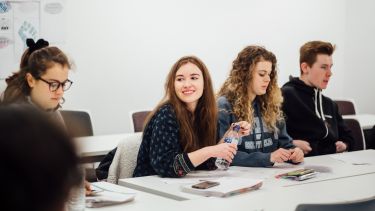The Beauty of Dual Degrees: Favourite Modules from English and History
One of the beauties of studying at degree level is the ability to frame your education around your interest. As an undergraduate student, my favourite aspect of my education was the freedom I was given to construct my degree to match my interests and niches.
Instead of following a rigid curriculum, I was given the ability to direct my own learning. As someone who finds themselves burdened by studying the same subject for a long period of time, I knew I would need a degree that provided me with variety and options, and I found this in my English and History degree. Over my three years as an undergrad, I have studied a plethora of subjects and themes and I have been enriched with a wide range of knowledge. Choosing a favourite module would be impossible, as condensing three years into one module would be impossible. Instead, I am going to share a few of my favourite modules from both English and History. For the sake of consistency, I will share my favourite English modules first and then my favourite History modules, rather than going chronologically in accordance to the year I studied them in.
My first ‘educational’ love has always been English. As a child I amassed a large collection of Jacqueline Wilson, Cathy Cassidy and Rachel Renee Russell books and spent most of my time at the local library. In sixth form, I even sacrificed my breaks to volunteer at the school library. I love reading in all capacities, therefore when I got to university I was enthralled by the possibility presented to me to study literature in all mediums. I studied a large range of subjects, and one of my favourite modules was the "Fin de siècle Gothic" module taught by Dr Andrew Smith. This module introduced me to and cemented my love for Gothic literature. Within this module, I read texts such as The War of the Worlds, Dracula, The Strange Case of Dr Jekyll and Mr Hyde, She, The Blood of the Vampire, Amour Dure and much, much more. The module not only introduced me to the Gothic in a much more detailed way but also set out the societal framework in which the novels were produced. Learning about how middle-class social anxiety and fear of invasion framed the vampiric novel and how artefacts and history are interpreted in tales of horror made the module incredibly engaging and thrilling for me. Despite this module being the longest assignment I had written up to that point, I found myself wishing I was allowed to write more as I had so much to say in my assignment. I studied this module in my final year and it was definitely one of the influences which encouraged me to study English at postgraduate level.
My other two favourite modules were "The Brontës", taught by Dr Amber Regis, and "Women Playwrights on the International Stage", taught by Dr Frances Babbage. The Brontë sisters were figures I had awareness of as literary cultural icons but I had never actually studied them in detail. This is something I regret not doing until this module. I LOVE THE BRONTË SISTERS. After reading every novel from each sister, I can confidently say their mark on history is one that has been greatly earned. With the marvellous guidance of Dr Amber, I was able to explore the Brontës' written work and their personal lives in tandem - I am ashamed to admit I didn’t know they wrote under male pseudonyms, nor had I read Jane Eyre until this point. Amber’s enthusiasm transferred to me and I found myself loving these women and their questionable understanding of love. My favourite novels from each sister are as follows: Jane Eyre by Charlotte Bronte, Wuthering Heights by Emily Bronte and The Tenant of Wildfell Hall by Anne Bronte. Each man in all of these novels is just awful!
Women Playwrights on the International Stage greatly appealed to my thespian side. I love all things theatre, opera, and play, and in this module, I was able to read some very engaging works from women across the globe. Dr Frances Babbage led this module with expertise and undeniable authority on the texts. She opened to door for me to explore the written world of female playwrights and their message. The likes of Marita Bonner, Zinaida Gippius, Charlotte Leffler Edgren, Amelia Rosselli and Alfonsina Storni were brought to my attention and their worlds of brilliance. I have always loved theatre, but this module brought theatre to my very screen. Despite both these modules being run online due to the pandemic, Regis and Babbage both did fantastic jobs in working with what they were given and leading unforgettable modules. My favourite plays were The Purple Flower by Marita Bonner, Her Soul by Amelia Rosselli and The Master of the World by Alfonsina Storni.
History is my other love. My love of history developed, much like many other people's, through Horrible Histories. Of course, history at degree level is a lot more different, but the joy of learning and understanding the world is still the same. One of the university’s strengths is the large and extensive range of history topics to chose from. Every new semester was a challenge, purely due to the fact that I was always spoilt for choice and option in the subject area. However, I did find myself gravitating towards a particular type of history, namely social and gender history. This focus on gender and social history was born after my first history module in my first year, "The Disenchantment of Early Modern Europe c. 1570-1770". This module was run by a range of different lecturers who all displayed their extensive knowledge of their subjects. This is a popular choice among first years, as this module introduces you to the precarious world of Early Modern Europe. Within the module, we studied the Reformation, the Age of the Enlightenment, witchcraft, the humour theory, the one sex theory and much more. This is a module that gets a thumbs up from every student. Through this module, you are given an overview of how Europe became more secular in its views, the discovery and advancement of science and the influence of the Church. Even as a postgraduate student studying English Literature, I often think about this module fondly and am slightly dismayed at the fact I couldn’t study a dual at postgraduate level.
Finally, the last favourite module I took was in my second year, which was "Gender in the Long-Eighteenth-Century" run by Dr Kate Davison. This module was so influential on me that I was inspired to write my dissertation on one of the topics taught in the module. This module was one of the most enjoyable subjects I studied, exploring gender as a social construct in which masculinity and femininity are socially created and enforced was incredibly eye-opening to discover. Within the module, we also explored the sexuality of men’s calves, homosexual spaces, the erasure of lesbian spaces, sex, the ways in which women’s sexualities were constantly used against them, and the understanding of the female reproductive system as an inverted penis. All very interesting! I highly recommend reading about it. I cannot express how much I loved this module and all the reading I conducted.
University is such a wonderful time!
Written by Valentia Adarkwa-Afari, Digital Student Ambassador, on 2 March 2022.


